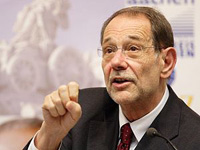Solana ready for talks with Iran over nuclear program

Before the U.N. Security Council deliberates on possible new sanctions against Tehran, Javier Solana is ready to hold another round of talks with Iranian nuclear negotiators.
"They have not offered any dates. I will be at their disposal for this week but it has not been possible," Solana said.
Iran's deputy nuclear negotiator on Tuesday canceled a meeting with EU officials to set up new talks between Solana and chief Iranian nuclear negotiator Saeed Jalili.
Solana said he had little or no time to meet with Jalili next week as he will attend a Middle East peace conference in Annapolis, Maryland, and will visit the Balkans.
He said he was in permanent contact with the United States, Russia, China, France, Britain, and Germany over Iran's nuclear enrichment plans and he is expected to submit a report to the six by the end of the month over whether there progress was made in the few rounds of talks he has had with Iranian officials over recent months.
Solana has been tasked by the six powers to persuade Tehran to heed U.N. Security Council demands to suspend uranium enrichment, a technology that can be used to create uranium fuel for power plants but also the fissile material of nuclear warheads.
Iran says it wants to use it only to generate power, while EU nations and the U.S. fear it could be used to develop weapons.
EU officials said Tehran was keen to meet only at the end of the month, in an apparent attempt to delay Solana's report and a possible third round of sanctions against Iran.
Iranian President Mahmoud Ahmadinejad said Wednesday his country would not give any concessions to the West over its nuclear program beyond transparent cooperation with the U.N.'s International Atomic Energy Agency.
Solana's report, together with IAEA findings on Tehran's nuclear activities that were forwarded to the U.N. Security Council last week, will serve as the basis of deliberations on whether to impose new punitive measures.
Solana had been seeking an early meeting with Jalili in part because of pressure from the United States, France and Britain, which are seeking new sanctions. Russia and China, the two other permanent council members, are reluctant to impose new penalties, saying there is still room for negotiations before such a move.
Subscribe to Pravda.Ru Telegram channel, Facebook, RSS!




